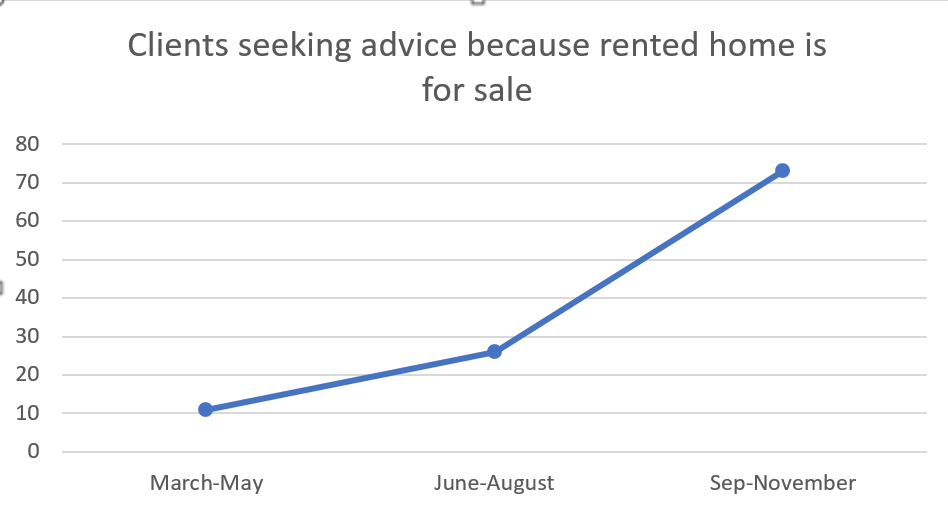Tenants’ rights when landlord wants to sell

Our advisers have noted an increase in the number of people contacting us for help because their home is being sold by their private landlord.
We’ve already received as many calls about this issue in the first 9 days of December than we had during the whole of March, April and May of this year.It’s important that tenants know what their rights are if their landlord decides to sell their home, and know how to get advice and help if they do need to move.

Tenants have an absolute right to at least 12 weeks’ notice to quit
Some of the tenants we have spoken with think that the emergency COVID-19 extension to notice to quit periods does not apply if the landlord is selling the property. This is simply not true.
Any notice to quit must be given to the tenant at least 12 weeks before they must leave the property, regardless of the landlord’s reasons for eviction. If the tenant remains in the property after the notice expires, the landlord must apply to a court for a possession order.
It’s important for tenants to be aware that bailiffs do not operate in Northern Ireland and a private company can never forcibly remove a person from a home they have been renting. Instead, an order for possession must be enforced by court officers .
Can a property be sold with a sitting tenant?
A property can be sold with a sitting tenant. If this happens, the new owner will become the landlord, and must register as such.
The new owner will have to honour any terms set out in the tenancy agreement the tenant had with the former owner until the contract expires.
Once this contract ends, or if the contract has already expired, the new owner can
- Allow the tenant to stay on a rolling contract
- Give the tenant a new tenancy agreement or
- Begin eviction proceedings against the tenant.
Can the landlord evict a tenant because the property is for sale?
Some purchasers will not want to complete the sale until the tenancy has been ended and will put pressure on the landlord to evict any sitting tenant.
Landlords do not need a reason to evict a tenant whose contract has expired, but must still provide 12 weeks’ notice and follow the proper legal procedures.
If the tenant has a contract, they must be allowed to remain in occupation, unless
- the landlord successfully gets a possession order due to the tenant’s persistent or serious breaches of the tenancy agreement
- the contract allows for early termination of the lease and the term setting this out complies with fairness rules.
Fairness of contract terms
Any contract, including a tenancy agreement, set up from October 2015 must comply with The Consumer Rights Act. One of the provisions of this act is that a contract term can only be enforced if it is fair, prominent and transparent.
A term will be unfair if it causes a significant imbalance in the parties’ rights to the detriment of the consumer. It is certainly arguable that a term which allows the landlord to end the contract early because they want to sell the property would satisfy this requirement.
Why are landlords selling up?
Although only 6% of landlords surveyed by NIHE in 2019 stated that they were considering selling up in the next 12 months, it seems that the impact of COVID-19 has had a big impact on those intentions.
It’s reasonable to assume that some landlords will have been incentivized to sell by a buoyant property market, likely triggered by intense demand for properties amid cuts to stamp duty rates.
Just 2% of the landlords surveyed by NIHE identified as full-time professional landlords. Landlords, many of whom will see their rental portfolio as a side-earner to their main employment or business, will not have escaped the economic impact of COVID-19. Indeed, 30% of landlords surveyed by the National Residential Landlords Associated indicated an intention to sell at least one property in the coming year.
Get advice on your rights and options
Tenants should get advice as quickly as possible if their landlord has plans to sell the home. Call our helpline. We’ll let you know what your rights are and whether you have to prepare to move out.
Landlords who are unsure about the procedures they must follow if they wish to sell a tenanted property should contact Landlord Advice.
Our mediation service may be able to help where landlords and tenants are unable to agree on a way forward when the property is put up for sale.






